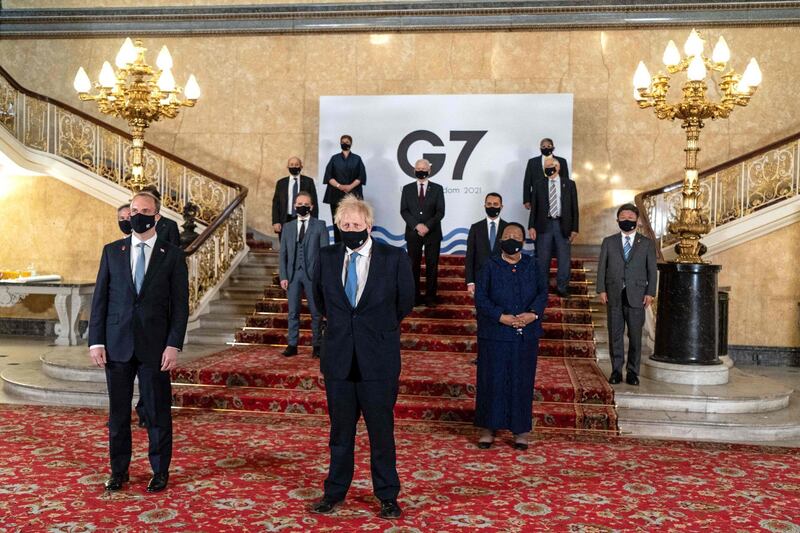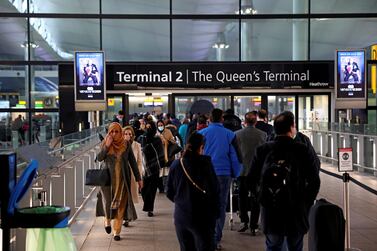Diplomats from Canada, France, Germany, Italy, Japan, the UK and the US, and representatives from the EU, have met in London for three days of talks on the key global issues affecting people, the planet, security and future prosperity.
Here are the six key takeaways from the London G7 summit:
Iran
The G7 said they were committed to ensuring that Iran would never develop a nuclear weapon and welcomed discussions between the nuclear deal signatories, and the US, for all parties to return to the agreement covering Tehran’s nuclear programme.
The diplomats asked Iran to allow for these talks by avoiding any further escalation and said the latest Iranian actions were very serious.
The G7 supported the International Atomic Energy Agency in its monitoring and verification work.
They said they condemned Iran’s support to proxy forces and militias, and called on Iran to stop all ballistic missile activities.
The G7 supports efforts to ensure a thorough investigation into the Ukraine International Airlines Flight 752 tragedy to hold Iran accountable.
The group said they were deeply concerned by the continued human rights abuses in Iran and called for the release of all foreign, dual nationals and human rights defenders who faced arbitrary arrest, detention and lengthy prison sentences.
Syria
The G7 condemned the regime of President Bashar Al Assad and its backers’ continuing atrocities against the Syrian people.
They called for unhindered humanitarian access into Syria, which is crucial for easing the effects of the crisis, which s now in its 11th year.
The group also supports a political solution to the Syria conflict in line with a UN Security Council resolution.
This includes a nationwide ceasefire and a safe and neutral environment for refugees to return.
The G7 called for free and fair elections under UN supervision. Only when a credible political process is firmly under way would the G7 consider assisting with rebuilding Syria.
The group called on the regime to refrain from further use of chemical weapons and said they were firmly committed to accountability for those responsible for the use of such arms and breaches of international law.
Yemen
The continuing conflict in Yemen, with its repercussions on the unity of the country and its independence, continues to be a cause of serious concern for the G7.
They called on all parties in Yemen to agree to UN proposals for an immediate ceasefire, the free flow of imports through Red Sea ports, the reopening of Sanaa airport, and the resumption of inclusive political talks, with meaningful participation of Yemeni women and youth.
The G7 condemned the Iran-backed Houthi rebels' cross-border attacks on Saudi Arabia and their continued Marib offensive.
The called for accountability for human rights breaches and abuses, and stressed the need for all the parties to the conflict to provide full humanitarian access and ensure the protection of civilians.
Libya
The G7 welcomed the progress achieved in Libya since the start of the Berlin Process, including the recent endorsement of the interim Libyan Government of National Unity and Presidency Council.
They called on the GNU to make the necessary preparations for inclusive, transparent and credible national presidential and parliamentary elections on December 24, 2021.
The group also wants to see an improvement in the delivery of basic services to the Libyan people, respect for human rights, protection of refugees and migrants and to ensure the full participation and protection of women and youth.
The G7 also stressed the importance of unifying Libya’s institutions and protecting its national oil infrastructure, ensuring that oil revenues are transparently budgeted and distributed for the benefit of all Libyan people.
The Sahel
The G7 said they were concerned by continuing instability, increasing violence, and the deepening humanitarian crisis in the Sahel.
They welcomed enhanced efforts to tackle the causes of instability in the region.
They welcomed the implementation of the “civil surge” agreed on during the N’Djamena Summit in February 2021, and structural reforms to address the rule of law, anti-corruption and inclusive governance.
The group underscored the need for all involved in the Sahel to respect human rights, including the right of women to take part in conflict resolution and peacebuilding processes, and international humanitarian law.
They called for the continued implementation of the peace agreement in Mali and credible and inclusive elections to achieve a timely return to a democratically elected government that meets the needs of all Malians.
Reaffirmation of core values
The G7 said they were committed to championing media freedom as a vital part of upholding democracy and human rights around the world.
They condemned intimidation, harassment and violence against journalists.
The group said they were concerned about actions by states to intentionally disrupt their own populations’ access to, or dissemination of, information, knowledge and data online.
Internet shutdowns and network restrictions undermine civic space, online and offline, and unjustifiably limit access to information and the rights of peaceful assembly, association and freedom of expression online.
The G7 also committed to work together to further a common understanding of how existing international law applies to cyber space.
They reaffirmed a shared commitment to uphold international law, which is an essential and binding element of the framework for state action in cyber space, and applies to state behaviour in cyber space just as it applies to any other domain.
The G7 said they were committed to promoting freedom of religion or belief for all, and strongly encouraged all states to treat every person equally under the law, regardless of their religion or belief.
By working together, the G7 said they would deter those who target democratic institutions and processes, seek to undermine public confidence in the integrity of democracies, and try to interfere in the information space.
They also pledged to continue to share best practices and develop common approaches to issues such as foreign interference, protecting elections, responding to disinformation and information manipulation, and engaging with social media platforms.







